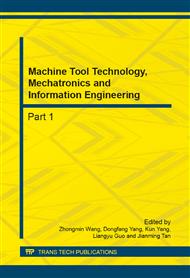p.1510
p.1514
p.1519
p.1523
p.1527
p.1531
p.1535
p.1539
p.1543
Radio Resource Allocation Algorithm Based on Bargaining Game Theory for LTE System
Abstract:
With the rapid development of wireless communication technologies, users could get many kinds of services and applications now. And as the number of users and the amount of traffic are growing, the contradiction between the infinite demand of users and the finite radio resources is getting increasingly apparent. According to this situation, this paper propose a radio resource allocation algorithm based on bargaining game theory for fourth generation long term evolution (LTE) system, with which the network could balance the situations of users in different classes and enhance the utility of users. The simulation results show that the proposed algorithm could allocate the radio resources efficiently and provide users with higher utility.
Info:
Periodical:
Pages:
1527-1530
Citation:
Online since:
September 2014
Keywords:
Price:
Сopyright:
© 2014 Trans Tech Publications Ltd. All Rights Reserved
Share:
Citation:


